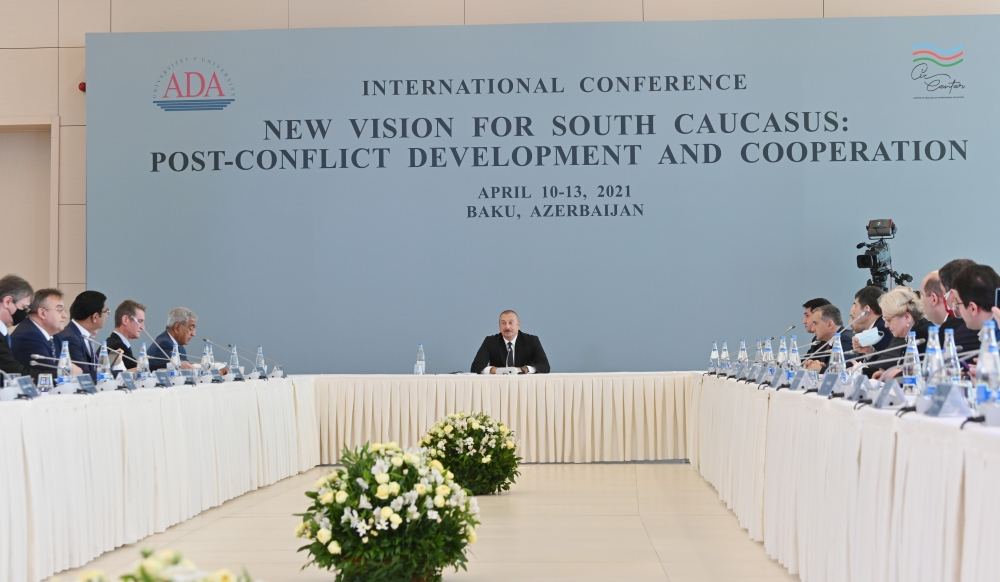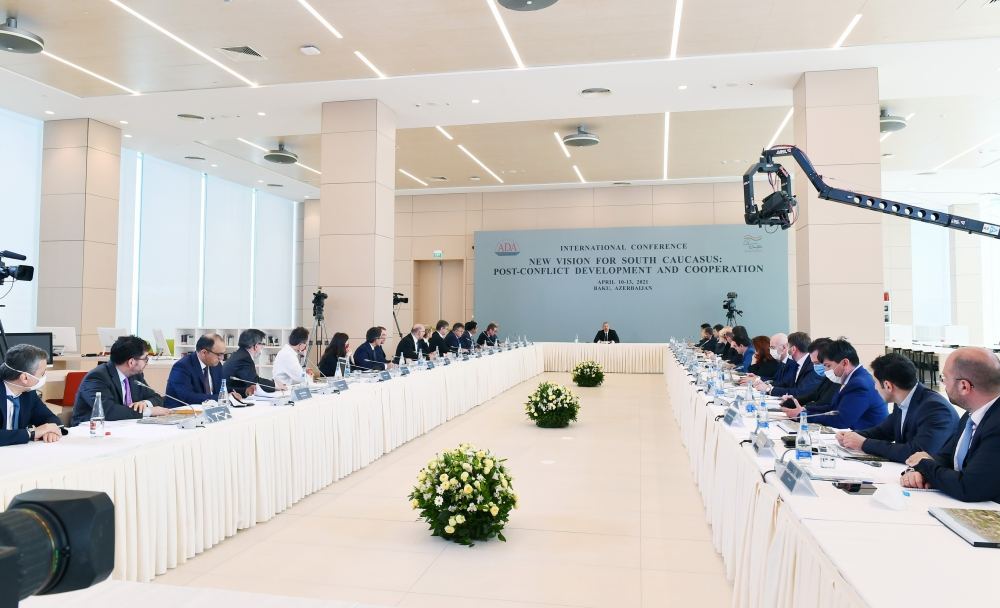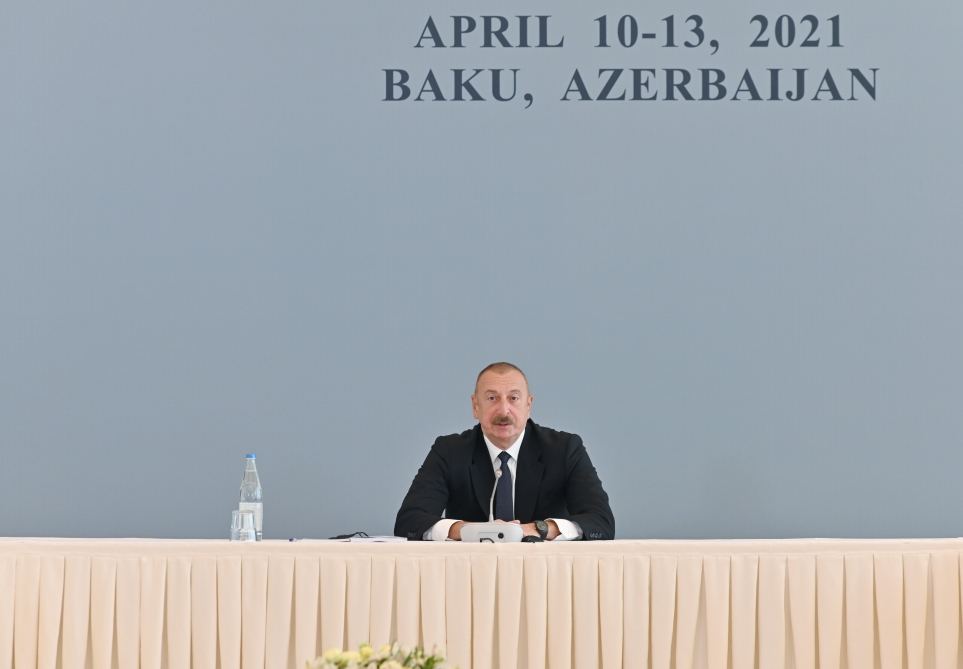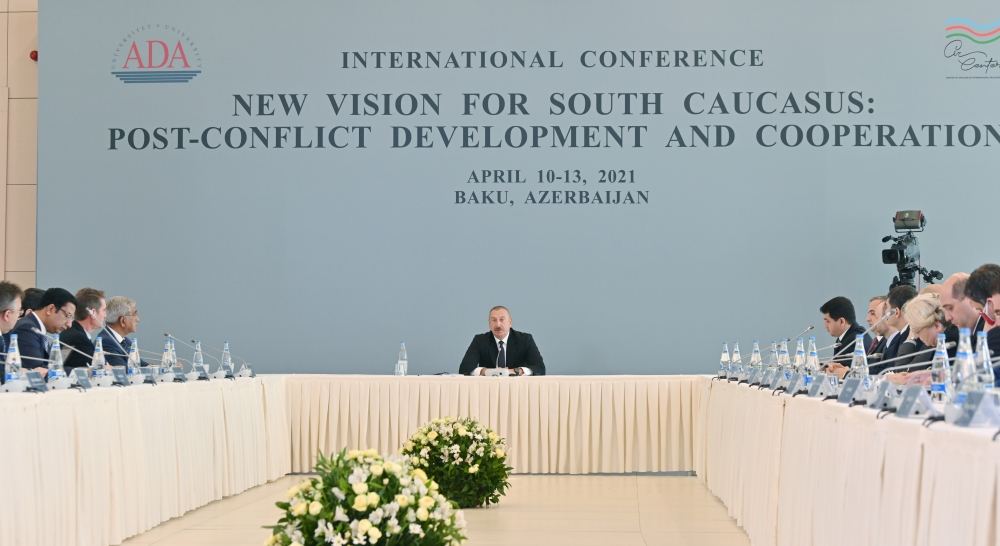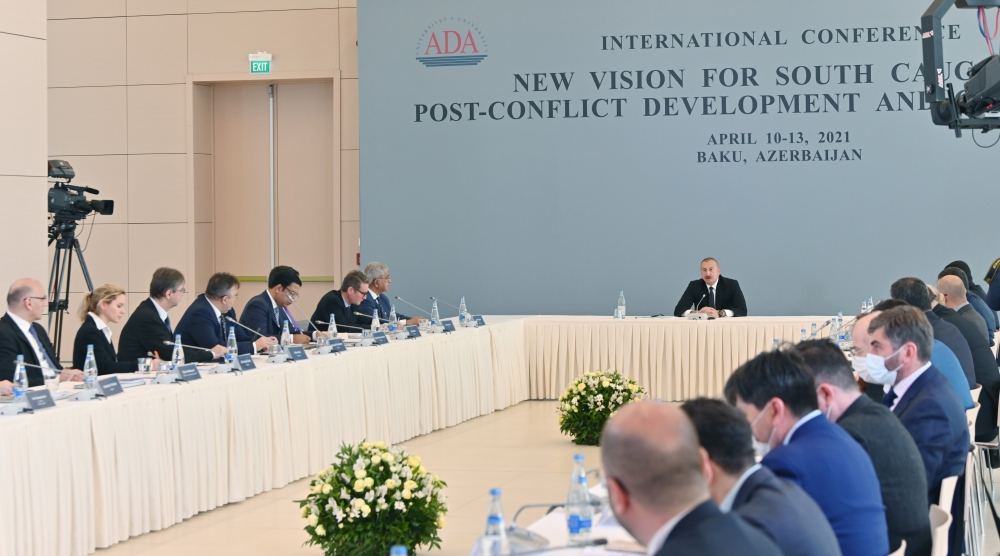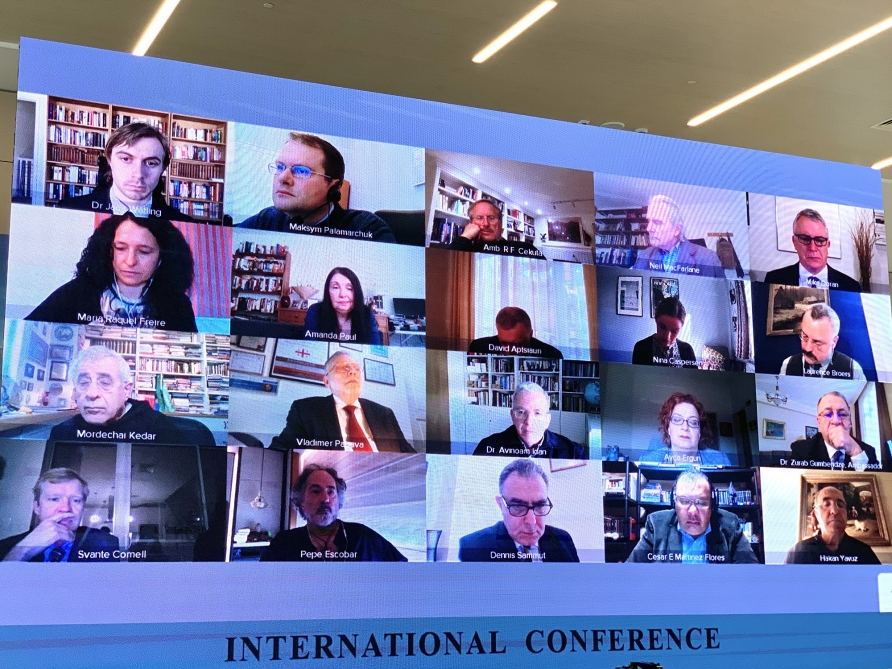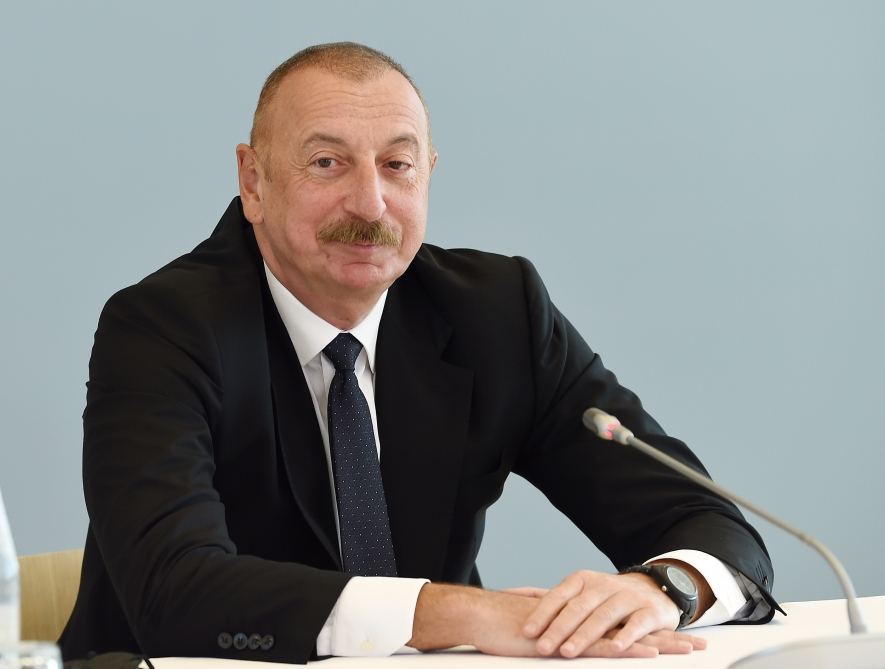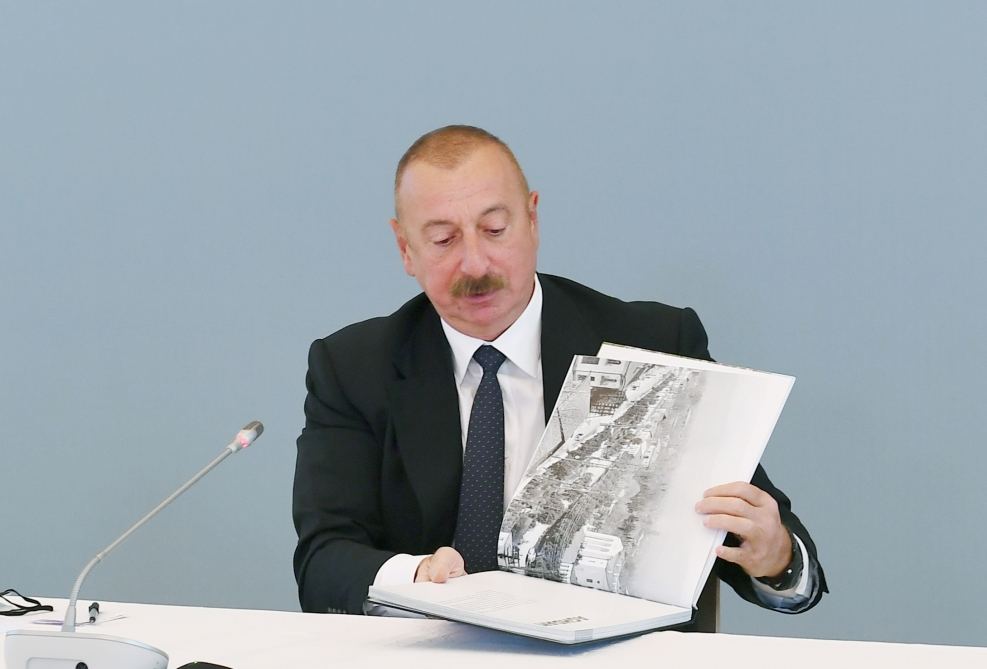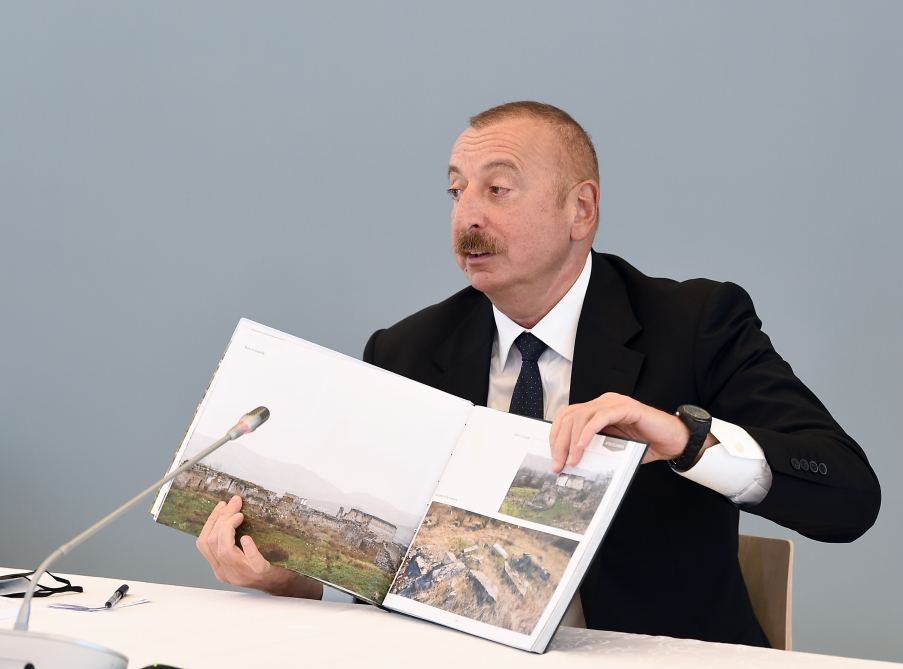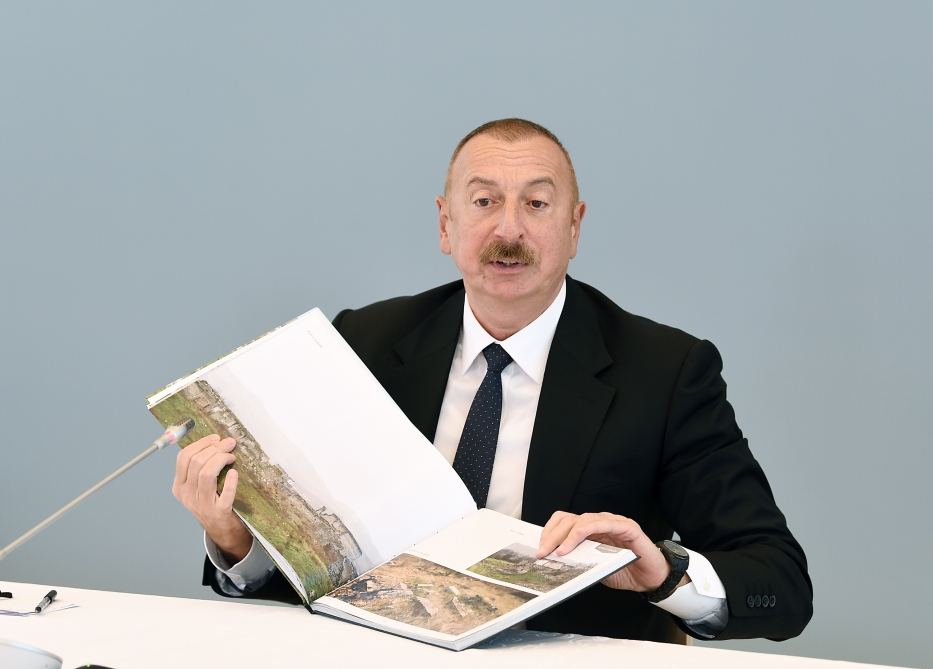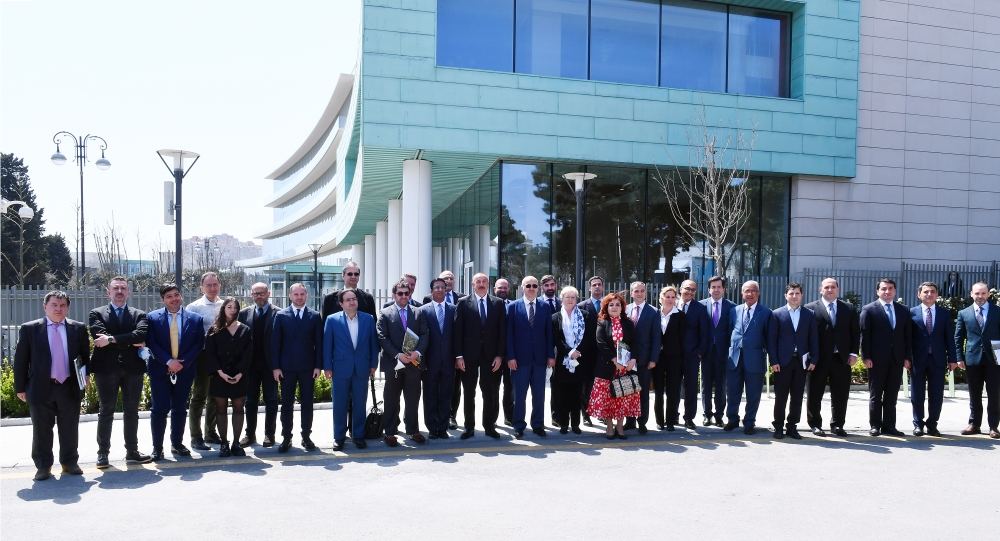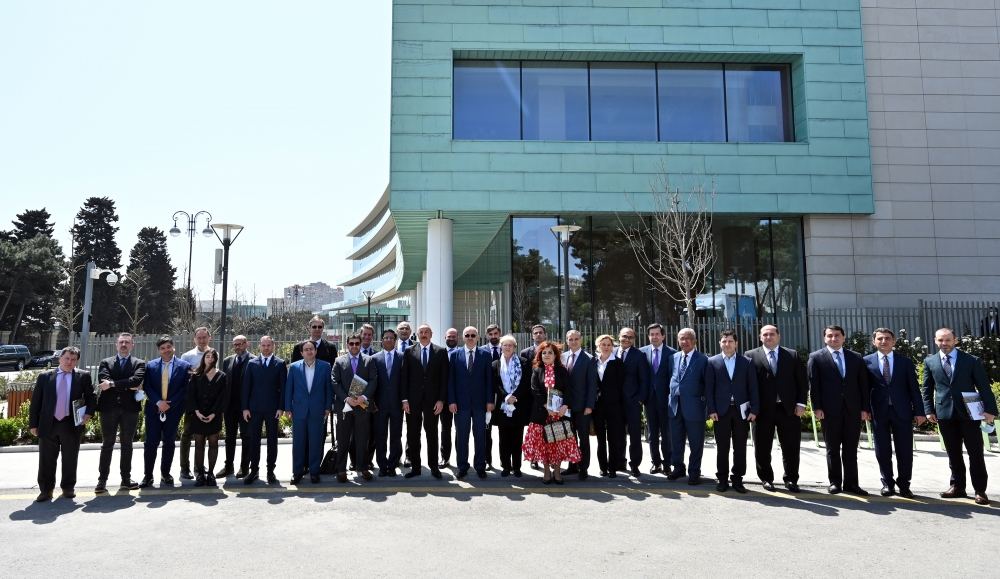BAKU, Azerbaijan, Apr. 15
Trend:
President of the Republic of Azerbaijan Ilham Aliyev has participated in the “New Vision for South Caucasus: Post-Conflict Development and Cooperation” international conference held at ADA University.
In his opening remarks at the conference which is attended by representatives of world’s leading think tanks, Rector of the ADA University, Ambassador Hafiz Pashayev said:
-Your Excellency, Mr President, dear participants of conference.
On behalf of all attendees I am honored to thank President Ilham Aliyev for his participation today at our conference, and for willingness to share his vision for the future of the region. President Aliyev is the founder of our university and has always been a strong supporter of educational reform in the country. His vision for modern university in Azerbaijan and turning it into international platform for academic and policy discussions is serving our today’s event very well as ADA university is one of the main organizers of the conference. Mr. President, welcoming you at our university I would like to take this opportunity and on behalf of faculty and students congratulate you with decisive victory in Karabakh war which has resulted in the liberation of internationally recognized lands of Azerbaijan, and restoration of territorial integrity of our country. We have longed and dreamed of these days for thirty years and your leadership, as well as heroic sacrifice of our fallen heroes have given Azerbaijani nation this wonderful moment of joy and glory. Dear participants, we are holding these discussions following your trip to Aghdam, one of the liberated regions of Karabakh, where you have witnessed destruction and the horrible impact of Armenian occupation. The war is over and now is a time for the new vision for South Caucasus with the focus on development and cooperation in order to make Karabakh one of the best regions of the world. Faculty of our university have been involved in various policy formulation meetings as well as conduct of repatriation survey among the IDPs to help our government in reconstruction efforts. Your contribution, ideas and input in this regard come very helpful to us and we thank you for travelling to Baku and joining our conference. Mr. President, once again, we thank you for your time and it is my great honor to pass floor to you. Thank you.
Addressing the event, President Ilham Aliyev said:
-Thank you. First of all, I would like to express gratitude to ADA university, and to rector Mr. Pashayev for organizing such an event. I am glad that ADA University within the relatively short period of time became one of the leading universities in Azerbaijan and has a very broad international connections. Also, I’m very grateful to the participants of the conference for their participation, because as you can imagine the situation after war is very fragile. Though the ceasefire is being maintained still there are a lot of questions about post-conflict development and the topic of the conference is post-conflict development and cooperation. Therefore, once again, thank you to all the participants for your attendance. We consider this as not only a sign of interest to what is happening here in the region but also as a sign of your solidarity with the people of Azerbaijan who suffered from Armenian occupation for 30 years. Before talking about post-conflict development we need to understand that our lands were under occupation for 30 years and we cannot exclude our memory, the memory of those who lost their family members, the member of those who were deprived from the fundamental right to live on their own lands.
We cannot forget the atrocities committed by Armenian army. We cannot and will never forget Khojaly genocide and the innocent victims of Khojaly genocide organized by the leaders of Armenia and the so-called Nagorno-Karabakh regime. Therefore, it’s very important to understand that this memory will be with us. We will keep it in our heart. At the same time, we need to look to the future. Also, the destructions on the territories which we liberated are beyond all our worst expectations. Because we more or less knew what Armenians have done to our cities and villages. Because there have been from time to time some video footages some information from some international representatives who managed to visit those lands.
Probably you know that foreigners who were illegally visiting then Nagorno-Karabakh were deprived of visiting the territories which you have visited. They were deprived of going to Aghdam, to Fuzuli, to other territories which surrounded the former Nagorno-Karabakh administrative district. Because Armenian government didn’t want foreigners to see the devastation and to see their hatred to Azerbaijanis, because it’s clear that those destructions and devastations were done after the first Karabakh war stopped. Because it’s not possible to destroy the cities and villages during the war.
They did it deliberately in order to erase the legacy of Azerbaijani culture in order to erase these territories from our memories, in order to change the origin of those lands. Therefore, we need to understand the feelings of Azerbaijani people and now when we returned to those lands and we see with our own eyes what the occupation of Armenian forces did to our historical monuments, religious monuments, to our cities and villages. Of course, this is a very important factor in order to understand our steps with respect to post-conflict situation. You are all very well aware of what happened. You were involved in this process you know. So, there’s no need for me to make a long speech talking about 30 years of occupation. Probably I will conclude now in order to have more time for discussions. So, thank you once again for being with us.
Assistant to the President of the Republic of Azerbaijan-Head of the Department of Foreign Policy Affairs of the Presidential Administration Hikmat Hajiyev: Thank you Mr. President. With your permission, we can start our question and answer section. As we have more than ten speakers, who have subscribed for asking questions and expressing their comments. Our first question and comments starts with Matthew Bryza, former co-chair of the Minsk Group.
Senior fellow at the Atlantic Council, international expert Matthew Bryza: Thank you Mr. Hajiyev, thank you Mr. President. It’s an honor to be with you. Very-very nice to see you in this new world. I want to pick up on where you just left off-about the mindsets both in Armenia and Azerbaijan. The fact that this decisive victory that Azerbaijan won through combination of innovative technologies, and tactics, but also incredible bravery. I don’t think people understand that you conducted the war in a restrained way. The collateral damage, or civilian casualties were at the minimum. You showed strategic vision by pausing after you won the military phase of war in Shusha. Consistently the war aims that were articulated, were also consistent with years of negotiations and preliminary agreement back in 2009, and the so-called basic principles. I mean that November 9-10 agreement is essentially the basic principles, except there is no possibility in the change of Nagorno-Karabakh’s legal status, because Armenia didn’t accept throughout the war that solution and then lost the war. So, my question is, is there any sense in Armenia, do you feel it at all that there is an appreciation that the way the war was conducted was actually quite restrained and then should create an opening for some sort of over time a reconciliation? And the second question is I’m supposed to ask, if you might be willing to take a group photo with us later?
President Ilham Aliyev: Yes, sure, of course. Thank you very much, thank you for your comments. You are a person who was directly involved in the negotiation process. Therefore, you know what was our position and you know what was Armenian position. The Azerbaijani position was always constructive, because as I said many times, during our meetings with your formal colleagues, ambassadors of the Minsk Group from France and Russia that Azerbaijan always was interested in finding soonest solutions to the conflict because we were the suffering side.
I had a strong feeling during negotiations and I shared it with you that Armenia doesn’t want a solution. They say they want but they do everything in order not to have this solution. What we have seen after we liberated the territories, those fortifications, those huge hundred millions of dollars investments in mining, in building this defense lines.
We clearly understand that they were doing it in order to keep these lands under occupation forever. So, their tactics was actually to be in the process of negotiations, I mean the previous governments, to have kind of a process, to imitate, to negotiate, to agree on something, to disagree on other things. But when it comes to make a decisive step to step back as it was in France, in Rambouillet, as it was in 2009 after Armenian side actually rejected the formula of settlement which provided the liberation of the surrounding territories of Nagorno-Karabakh to Azerbaijan and leaving the so-called status for future negotiations. Therefore, this is how it works. So, you know it very well. With respect to our behaviour during the war from the very beginning it was very clear that Azerbaijan is conducting not only the war of 21st century but the war of new morality if I may say so. When war started my immediate commands to our military servicemen was to behave with dignity to behave in a moderate way, and to do maximum in order not to do damage civilians. And the fact that there have been less than 40 victims on Armenian side among civilians clearly demonstrated. Because we were liberating territories.
“Some territories were illegally inhabited. Therefore, our attacks, our technical capability was aimed only on military objects. And those less than 40 victims which Armenian side had most of those people were participating in the military operations. They were civilians who were recruited to the military units and they were part of military operations. The way how we treated those who were left behind also is a clear demonstration of the human nature of our policy and human behaviour of our army. There have been several elderly people left behind for instance in the province of Hadrut. And when our soldiers came, they saw these people. They were frightened. The elderly people, they spoke very good Azerbaijani, because they lived together with Azerbaijanis, and they were taken to the hospital. They were treated in our hospitals. Then, when we decided and the Red Cross was involved to return them back, Armenians refused to receive them. One of the elderly who was in poor health condition, they refused to receive him, because they said that they don’t want to take care of him. So, we, together with the Red Cross put him to the hospital in Azerbaijan. And with respect to the question “do they in Armenia appreciate our behaviour”, I would say “no”. And this is a very unfortunate development of events, because if we are talking now about post-conflict situation, we need to concentrate on some elements which can lead to future reconciliation. But there have been such a long period of deliberate policy of demonization of Azerbaijan, inventing stories, presenting Azerbaijanis as enemies as those who occupied Armenia or occupied Karabakh. So, it probably takes time for the society to understand and not only during the war, but even after war what we have done. We returned more than 1500 dead bodies of Armenian soldiers. We are still participating together with the Russian peacekeepers in these searching operations. And I can tell you that in the first Karabakh war we had almost 4000 missing Azerbaijani soldiers. None of them was returned. None of them. So, this is a difference. We provide easy transportation, logistical support to Russian peacekeeping forces through our railroad. They bring the goods by the railroad to Barda. It is much easier and cheaper rather than to fly to Yerevan and then go 5 hours or 6 hours by Lachin corridor. And many other elements I can bring. We allowed Russian Gazprom to transport natural gas to Armenia through Azerbaijani territory because of the repair work on Russian territory. We could have said no, but we said yes. This is another sign, another gesture. We allow Armenians to use 21 kilometres of our road in Zangilan and Gubadli districts which is a road situated on Azerbaijani territory but was used by Armenians and we allow. We did not block it. Did they allow us to move one meter to the territories which were occupied during the war? No. So, these are all unilateral steps and it’s not only a gesture. It’s a deliberate policy of turning the page of the war. I said, despite of what I said in the introductory comment that we will never forget, at the same time, we need to look to the future. I think here we expect more activity from civil society of Armenia. Because neither government, nor opposition today will not even afford them to say any even not a positive and neutral word about Azerbaijan, because it’s a concept of Azerbaijanophobia. It’s decades of cultivation of hatred against Azerbaijanis now actually deprive them of their right. But I think they should find courage and they should start telling truth to Armenian people, because the war is already in the history, the conflict is resolved and we need to look to the future.
UK Conciliation Resources Laurence Broers: Mr. President, in the late 1990s there was a view in Azerbaijan that civil society and NGOs could come in and work with populations to build confidence once the conflict was solved. I wanted to pick up on where you left off there by asking you what is your thinking now given what you have said that the conflict is resolved. What should be the roles of civil society and peacebuilding in this new vision for the region? Thank you.
President Ilham Aliyev: I think that they can play a crucial role especially with respect to what I said about my expectations from the political segment of Armenian society. Therefore, it’s a big room for civil society to make steps with respect to reconciliation. But I can tell you probably you know that even those very few representatives of Armenian civil society who speak for peace with Azerbaijan are becoming a subject of attacks and public attacks and sometimes physical attacks. They are announced as traitors. Armenian politicians call them Turks. In their political slang it is probably very insulting word and they are being frightened by politicians. We made steps of building bridges between our civil society members even during the conflict as there have been two delegations visiting Armenia, Karabakh and coming to Baku. But after the second trip of representatives of civil society, journalists and some members of parliament, Armenian side stopped it. And when I asked then former Armenian President Sargsyan why they stopped it, there was no answer. Then we found out that they were afraid that there could be some rapprochement, there could be some elements of cooperation. They were always blocking that. But now, I don’t think that they are in this position but we need to be able to deliver our messages to Armenian society. Our resources are very limited. The public space in Armenia is strongly controlled by the government. As I said any positive sign or word about Azerbaijan is considered to be a treason. Therefore, I think that international organizations, especially those who have experience in dealing with this kind of issues of post-conflict reconciliation or normalization, confidence-building measures, I think we should count a lot on the support from international NGOs. Azerbaijan is ready to work with them on this issue.
University of Venice, Italy Carlo Frappi: Thanks Mr. President. It’s an honor being here. My question revolves around a need for reconstruction again and how Azerbaijan’s partners maybe helpful in that and particularly on Italian-Azerbaijani relations. 2020 was a watershed in our relations. This is not only because of the inauguration of the Southern Gas Corridor finally. But I would say it’s the result of a wider engagement especially as a result of the state visit last February in Italy which can be seen as a watershed. Declaration or joint declaration on multi-dimensional strategic partnership for signing whereby would highlight this. Italy for the first time made an open commitment to Azerbaijani territorial integrity. So, somehow, even without the departure from previous policy of equal distance. And also somehow kind of departure from what our European friends were doing and are still doing. So, this kind of commitment was symbolically reiterated also in the aftermath of the war. I remember this very high profile visit to the liberated territories by high profile Italian delegation and on that occasion Mr. President you said that you express Azerbaijani determination to closely work with Italy on this reconstruction process. So, my question is what is currently the state of the art and especially what we may expect in the coming future and how Italy can be helpful not only in the reconstruction process but also in this need for reconciliation. Thank you so much.
President Ilham Aliyev: Thank you very much. I fully agree with what you said about our bilateral partnership.
Italy is a very close friend and partner for us. I still remember my state visit to Italy last February. As you know, before that President of Italy Mr. Mattarella paid a state visit to Azerbaijan and my visit was also a continuation of our strategic dialogue. We signed a document on strategic partnership. By the way, it was the second. We already signed one, it was signed several years ago. So, this really demonstrates our mutual commitment. And also, as you correctly mentioned we are very grateful to Italy for their straightforward, just approach with respect to the resolution of the conflict, which we know that was not easy to articulate, especially in the European Union family, where there are very strong, powerful Armenian supporters who always tried to put on the same scale the victim of occupation and the occupational forces. So, that was really very important sign of cooperation.
Also I can tell you that we have already signed documents on strategic partnership with nine EU member states. I think some of them were also encouraged by what we have done with Italy. So, our political relations are excellent. We continue strong cooperation and this cooperation was already tested during the conflict and in post war period. And as you correctly mentioned, the visit of Italian delegation to the liberated territories is considered by us as another sign of support. I can tell you that from the very first days of our plans for reconstruction we invited Italian companies. We invited them through Italian Embassy. Here by the way, the Ambassador who already terminated his duties was very active in promoting Italian interests and Italian business and he is a very good friend of Azerbaijan. So, we approached Italian embassy in order to give us some recommendations with respect to Italian companies. We had previous contacts, because Italian companies implemented big projects here, in petrochemicals, refinery, construction, and architectural projects. They already started and we want to expand the presence of Italian companies. As I said, after war we will invite the companies from friendly countries. And this is natural, because the period of war was a kind of clear indicator for us who is who. Of course, we had some assumptions. We more or less could predict what will be the position of this country or that country. But to say 100 percent we are not sure. But the war made everything clear. Among the areas where Italian companies already have been invited, I can tell you maybe one of the most important, we invited Italian companies to participate in the project of different museums and war memorials, because we will have museums of victory and war memorials not only in Baku, but also in other cities liberated. So, this is one area. Another area where we invited Italian companies already, is power generation. The contacts have already started and after war not only contacts, but also some preliminary documents have already been signed, because there is a huge potential of power generation on the liberated territories, particularly renewable water, sun and wind. Preliminary documents have already been signed. We count very much on using Italian experience in developing agriculture on the liberated territories, because it’s a very good fertile soil on those areas and we can have maximum productivity. I can tell you that now at this moment among foreign companies we have only Turkish, Italian and British companies who already are working with the Azerbaijani counterparts. Of course, we are only now in the first stage of development. Though physical reconstruction have already started, infrastructure projects have already been launched. But there will be huge potential for the future. Of course, there will be more other companies from different countries. We want all our friends to be part of reconstruction, all our friends to benefit from this opportunities, because we as a nation and we as a government are very grateful . This is our nature. If someone does us something good, we will always keep it in our heart and will try to do everything to reciprocate. So, taking all that into account, our friendly relations, strong political ties, great experience of Italian companies and also our plans to restore our historical and religious sights and Italy is a world center of culture. That’s my opinion I’m sure you will share it with me. Therefore, there will be huge and diversified opportunities for working together.
International Crisis Group Turkish branch, Nigar Goksel: Mr. President, yesterday we were in Aghdam and we saw the massive physical destruction but we were also able to imagine that the tragedy of the lives torn apart and sort of human cost. And I imagine besides reconstruction, when the local people of Aghdam returned to their homes it’s going to take some time and effort for them to build trust with the Armenian villages nearby to be able to interact. So, I was wondering what kind of steps you expect from the Armenian side, also the Armenians in Karabakh to build that trust again so that they can live side by side without peacekeepers Inshallah one day. And also, in the bigger picture, I was wondering whether in the short or medium term you think it will be useful for Turkey to open its border with Armenia both for a regional integration and to address the demonization and the Turkophobia that we see so rampant in the society. Thank you.
President Ilham Aliyev: Thank you. Of course, it is difficult to predict how Azerbaijanis and Armenians will interact in the future. I think to a large degree it will depend on the will and political wisdom of politicians, because I think we need to be more active here and in Yerevan in order to try to build bridges, of course, if Armenia wants that. We don’t know what are their intentions. They never elaborated on that.
“I already on several occasions made it very clear that we consider the page of the conflict turned down. We even can talk and I already said it a couple of times about a possible peace agreement with Armenia. These are our plans. But we do not have any messages of this kind from Armenian side. Armenian prime minister is silent, Armenian foreign minister is very aggressive and Armenia is not in the situation now to afford themselves to be aggressive against Azerbaijan. They should remember what happened during the war. Armenian opposition is now actually in hysteria. And Azerbaijanophobia, Turkophobia became one of the main, it always was very important but now, I think, it is the only factor. I am sure that they will build their election campaign on Azerbaijanophobia, Turkophobia on the feelings of revanchism. Therefore we cannot establish this interaction unilaterally. Our position is clear. We are ready for that. It will not be easy.
Those former refugees who will return to Aghdam and other territories they will see what Armenians have done to their lands, to the graves of their beloved ones, to their religious monuments. What will they feel? I can predict. I felt the same. When I was approaching the line of contact during the war, and was only able to see Aghdam through lenses from binoculars and when I went there, to all the occupied territories. Yes, I am a President and I must be in line with my duties, but we are all people we have feelings, we can hide them, we can control them but sometimes it is very difficult. So, I can predict what will be the feelings of former Azerbaijani refugees but as a President, as a person who looks to the future we will do everything if Armenia has positive signals to us to try to build these connections. And what already have been done from our side unilaterally, I already mentioned, is a clear demonstration of that.
And believe me, we could have not allowed any of these things happen and nobody could have forced us. We did it deliberately. So, this is as far as the first question is concerned. With respect to the second question, we see some signs and some very low voices in Armenian establishment about reconsidering it their policy, towards Turkey. Even during the conflict on several occasions I was talking about that saying that this is absolutely unacceptable and strange that such a small and impoverished and weak country as Armenia has territorial claims against such a great and powerful country as Turkey. They were so much under their ideological dogmas and this Turkophobia became a national policy that they even lost the feeling of reality. And as far as I know, the Turkish government is planning their steps in a very constructive way. But of course, they need to have an adequate response. First, what Armenia should do? They should refrain from territorial claims against Turkey. They should rewrite their constitution. They should adopt a new constitution, they are planning to do it. But that’s for political agenda of the government. The government wants to strengthen their political position. But at the same time, I think I can give them a good advice-to remove from their constitution territorial claims against Turkey. I don’t know in which country’s constitution there is a territorial claim against other country. I think it’s a unique situation and everybody should understand that there have been wars and wars and wars throughout the history, and their fake history with respect to the so-called genocide has nothing to do with reality. It was war for situation when people were fighting with each other, countries were fighting with each other but then, there was a reconciliation. By the way, at that time, Armenia had difficulties not only with Ottoman Empire. They also had difficulties with other neighbors and why they only selected Turkey for their unjustified attacks. So, Turkish government on several occasions publicly offered some creation of some joint groups of historians to look impartially, objectively to these issues. But they rejected. Why? Because they need this fake history in order to get political dividends. They were exploiting this fake story in order to get protection, to get now some assistance from some countries. So, that’s my position. At the same time, what I can add, of course, I cannot speak on behalf of Turkey but what I can say is not a secret that as you know today we are discussing the unblocking of communications and particularly Zangazur corridor. Zangazur corridor cannot be unblocked without Turkey’s agreement and their participation. Though, Turkey is not present in a trilateral working group on the level of deputy prime ministers of Azerbaijan, Armenia and Russia but Turkey is informed by us about what we discuss and if Armenia wants to put an end to difficulties with communications. If they want to have any opportunity to become a transit country it’s only Turkey which can provide them with that. And as far as I know, Turkish government is ready. So, again the ball is on Armenian side. They need good doctors. I said many times, they are poisoned with poison. This poison mainly comes from their diaspora which sits in a very quiet and nice places in Southern France, in California, in Krasnodar Krai, in some other capitals and enjoy their life. And they want those Armenians in Nagorno-Karabakh in former Nagorno-Karabakh and in Armenia to be their hostages and be their tools for them to pursue some ambitious and chauvinistic ideas. Armenian society needs to destroy the iron curtain if I can talk about these anologies. They are living in the iron curtain and they have been influenced by this poisonous ideas. We are ready to help them with that.
Senior Research Fellow at Academy of Sciences of the Russian Federation, Stanislav Pritchin: Mr President, it’s a great privilege to be with you today. Thank you for your time. My question is about future of Azerbaijan. Everybody knows that in less than two months Azerbaijan will celebrate the 30th anniversary of its independence and by this time probably Azerbaijan has resolved the key question, key goal for its independency, restoration of territorial integrity. From my perspective now the time to set up the long-term goals for the next 30 years and in this regard I would like to ask you how your vision of the future of Azerbaijan which goals now Azerbaijan as a state sets up for the future. How do you see Azerbaijan in 10-20 years regarding in terms of GDP, development of economy and strategy generally as a state? Thank you very much.
President Ilham Aliyev: Thank you. In order to answer these questions we need probably a special session for several hours but I will try to be very brief.
We actually have elaborated the mid-term and long term development strategy for Azerbaijan even before the war. Of course, the liberation of territories will be additional opportunities, because though the restoration of territories will demand a lot of resources, at the same time these resources will be spent in Azerbaijan. They will stimulate business, they will stimulate construction sector of our economy, they will create jobs, they will create opportunities, they will create additional values in agriculture. Therefore, now we, in a way, have two development programs; first is an annual development program which we approve every year, and also the development program until 2030, and the second is the development program for Karabakh reconstruction which is now only in the phase of beginning. So, now our governmental structures work on combination or coordination between two, in order not to spend twice for the same purpose. And for that purpose in the liberated territories we are now introducing an absolutely new model of governance. There will be different model of governance of presidential administration and there will be very modern approach to development not only during the reconstruction but also after it. Therefore, we are now evaluating all our resources which have been illegally exploited by Armenia. There is a big potential for mining in those areas. By the way, we already started illegal procedures against some so-called businessmen who were illegally exploiting our copper and gold resources on the liberated territories.
There is a huge potential for renewable energy, especially, energy of wind, and in some parts of the liberated territories for instance, in Lachin, Kalbajar. There is a huge potential for wind in Jabrayil, Zangilan huge potential for solar and also water. Now we have got access to our main water resources after we liberated Lachin and Kalbajar, because the most part of the water resources which Armenian population in Karabakh is using, are taking source there. We are now in the process of restoration of twelve hydropower stations which Armenians destroyed after the war stopped until they left Kalbajar. So, within 15 days they destroyed twelve hydropower stations. This also demonstrates their feelings and their policy. Of course, we want to create very special living standards on those territories, because people who will go back there suffered for 30 years. They need to have a decent life. Therefore, the first pilot project of smart village already started. City planning already started. So, Karabakh will generate a lot of GDP in non-energy sector of our economy, also transportation. Three airports are already in the process, in one airport works have already started. Railroad connections. Zangilan can become an important transportation and logistical hub taking into account its location and close proximity to the neighbors. With respect to the rest part of Azerbaijan, our main strategy is to develop non-energy sector of economy. Reforms which we implement bring good results. Mainly we see these results in good governance. We have collected more taxes and custom duties these three months than we planned. The surplus is around 400-500 million manats. So, our budget is based on 40 dollars per barrel and even if it’s 30 dollar per barrel, people of Azerbaijan will not feel it. So, industrialization, attracting more investments in non-energy sector, business opportunities. You all probably heard that the leading rating agencies improved our ratings. On the World Bank Doing Business report we are number 28.
So, business climate is improving and we have very educated people and young generation which now is generating ideas and its hope for the future. As I said during the war, the biggest burden of war was on the shoulders of those who were children when I came to power. So, we managed to help young generation to develop. Taking into account, energy resources and completion of all major oil and gas pipelines that will feed our economy with additional sources of supply. We do not depend on foreign aid, our foreign debt is something around 18 percent of GDP, and I put a target to reduce it to 10 percent of GDP which will be then one of the best results in the world. We have very low rate of poverty around 5 percent, when I came to this position it was 49 percent. So, we actually feel that we will be able to implement all our plans, which is with a strategic vision. But for that we need stability not only inside Azerbaijan, which we have for already 28 years, but we need stability beyond our borders. And one of the main concerns will be our steps in order to minimize risks. We have taken obligation of the chair of Non-Aligned Movement with a great success. Our international efforts in the region led to the creation of new formats of cooperation or a trilateral cooperation with Turkey-Iran, Georgia-Turkey, Russia-Iran. So this is also contribution to stability and predictability. Of course, there should be zero risk of revenge attempts from Armenian side. If they do it, I said we want peace, but we will destroy them completely. Destroy them completely and let them not forget what I say now.
Director of Institute for Security and Development Policy, Sweden, Svante Cornell (online): Thank you very much dear Mr. President. First of all, let me congratulate you and the people of Azerbaijan on the restoration of Azerbaijan’s territorial integrity. It is clear that this historic achievement has changed the politics of the Caucasus region and far beyond. Most importantly I think it has shown to the world the capabilities of Azerbaijan and the resolve of the Azerbaijan statehood. It has proven that Azerbaijan is not an object of some real or imaginary geo-political games between great powers, but actually a power and an actor on its own right. And I would add that this is a trend we are seeing across the region with increasingly several states developing into real actors and such as Uzbekistan and Kazakhstan alongside with Azerbaijan. As this is becoming clear Mr. President, my question is how will this impact Azerbaijan’s foreign policy, its relations with surrounding countries including regional powers but also the countries to the East, and Central Asia with whom you share many interests? Thank you.
President Ilham Aliyev: Thank you very much, thank you for your comments and for your congratulations with respect to restoration of territorial integrity and you are absolutely right we demonstrated our capacity which I am absolutely sure was not known to many members of international community. Actually, all these years we were doing our homework in a quiet atmosphere. It was not that we were hiding something. No. Everything what we have done, was done openly. But we were not trying to advocate for us, we were not trying to make presentations, to make some PR actions. We were doing what was right for the country, for the people, addressing a lot of social issues, resettling refugees, providing restoration by force our territorial integrity if Armenia does not do it peacefully. So, war was a kind of a concentrated implementation of our capacity. And we never over-estimated ourselves. We never thought that Azerbaijan is a number one or number ten issue on the agenda of the leading countries. No, they have another issues and we are fine with that, because the less big powers remember or think about us the better for us. What will happen or what is happening now? With respect to the neighboring countries, relations develop successfully. The war demonstrated once again-I don’t want to go into much details-but basically we are satisfied with the behaviour or actions of our neighbors. Of course, we are very grateful to brotherly Turkey for the very strong political and moral support from the first until the last day of the war. But with respect to our three other neighbors, our main target was that they be neutral and it happened to a certain degree, in some countries to a large degree. But nevertheless, I don’t want to go in much details, and after war situation also demonstrates that now our neighbors share our views with the regional development. By the way, we already discussed it with our neighboring countries how the region should develop, what should be the projects of transportation, of logistics, energy cooperation, trade, etc. So, we don’t have any division. It’s true that Armenia did not yet publicly declare their policy, but what they do de facto I think is also satisfactory, I mean the government. With respect to our neighbors across the Caspian also relations were developing very successfully and with each of them we have a special track of cooperation. The biggest part is related to transportation, because Azerbaijan after completing all the transportation and logistical projects here like railroad connection with Turkey, sea port and highways became already an important transportation hub. Though we are landlocked but nevertheless we participate actively on East-West and South-North transportation corridors and now more countries are involved in these projects. So, main area of our cooperation with our neighbors across the Caspian is transportation, but not only. We are working very closely on how to increase the volume of mutual trade, how to provide better opportunities for mutual investments.
Executive Director of Center for Global and Strategic Studies Lieutenant Colonel Khalid Taimur Akram: Thank you very much and Mr. President. On behalf of people of Pakistan and Pakistan, I would first like to congratulate you on this victory. The people of Pakistan are very proud of you and you have become a celebrity in Pakistan, because every day you are in newspapers in Pakistan. And now even in the international relations departments of various universities, big universities in Pakistan they are studying the Karabakh war and the success of Azerbaijan. In Pakistan we are very proud of you, and the Azerbaijani nation. So, coming over to my question sir, during the last 44-days war Azerbaijan was fighting only in its own territory. Precisely targeting the military positions and military equipment of Armenia in the occupied territories. But Azerbaijan was faced with the constant war crimes of Armenia. Armenia deliberately targeted densely populated areas and civilians of Azerbaijan in the 44 days of war. We remember the ballistic missile launch to Ganja, Tartar, Barda and other cities and recently from the media we saw that the remains of Iskander M ballistic missile which was found in Shusha, launched by Armenia. Before it was also mentioned by the Armenian prime minister that Armenia has launched Iskander M missile on Azerbaijan during the war. This ballistic missile is very dangerous and can carry a nuclear warheads also. What is your opinion on it and what should be the actions of the international community on this action?
President Ilham Aliyev: Thank you for the congratulations. Thank you to Pakistan. I would like to ask you to convey my gratitude to the people of Pakistan for continuous support during the war and Pakistan was among the countries which openly supported Azerbaijan from the first days of the confrontation. Until the last days Pakistan was always on our side. We are very grateful to Pakistani government and Pakistani people for a very consistent approach to the issues related to our territorial integrity. Maybe many of our participants do not know but Pakistan is one of the very few countries which did not establish diplomatic relations with Armenia because of their aggression and occupation. There are only very few countries like Pakistan. So, we are always grateful for that and this is a real sign of our brotherhood. And probably you know that during the war there have been many flags of Turkey and Pakistan in our cities and we, of course, were telling who is supporting us. And that was coming from the hearts of the people.
With respect to the war crimes committed by Armenia, it’s not for the first time. They committed war crimes during the first Karabakh war but at that time it was different information environment. And many facts of atrocities and barbarism were not documented or if documented they did not reach the international audience. Therefore, they managed to hide their war crimes. At that time it was not only Khojaly, but many other villages like the village Aghdaban in Kalbajar, not many people in the world know about that. But that was more or less the same. They were killing and burning innocent civilians and many other villages have been victims of Armenian barbarism. And during the second Karabakh war, as you said, it was in front of the eyes of international community how they bombed our cities and villages and not only with ballistic missiles, they were bombing with artillery and mortars every day. 16 thousand bombs were thrown on Tartar which is a small city. They even bombed the ceremony on the cemetery killing a family. They were bombing Barda, they were bombing Naftalan when they killed a family of five. They were deliberately attacking our cities and villages and they thought that they will stop us by doing that. We did not do the same, we never hit any village or any city. We hit only, yes, military objects which were in Khankandi, but we hit military objects. Using ballistic missiles on the sleeping city of Ganja was a clear indication of their barbarism, because that ballistic missile, it had a target. It was not by chance that it hit a residential compound. It was a targeted attack at night when people were sleeping, and not once, several times. What have they done after that? They said it was not them. Officially, Armenian officials said it was not Armenians who did it, but then who did it? Who? Ourselves? You probably know that they even wanted to put a blame for Khojaly genocide on Azerbaijan. They were inventing these stories and trying to persuade international community that Azerbaijanis themselves killed innocent victims in Khojaly and they did the same with respect to Tochka U and Elbrus missiles.
They even hit Khizi which is situated hundred kilometres from Baku. They wanted to reach Baku. They were attacking Gabala. Gabala is far away from the area of conflict. So, Barda, Aghdam, Aghjabadi, Fuzuli, Goranboy, Naftalan, Khizi, Gabala. That’s what they were doing. There were no military installations. And, of course, the news about Iskander attack was a surprise for us. When Armenian prime minister said that they used Iskander but it exploded by only ten percent, everybody was laughing. Probably, he could not properly deliver the message which he wanted to say. And when I was asked in the end of February, I didn’t say they didn’t do it. I said we did not detect it. It is different things. At that time we did not detect it. But after he said that after former president Sargsyan said that they launched Iskander, but he was regretting that they did not launch Iskander on our pipelines. This war criminal Sargsyan whose hands are in blood of innocent victims of Khojaly was accusing Pashinyan that they did not hit the pipelines. Then former chief of staff of Armenian army Movsesyan, I don’t remember his name, he said they used. Then we had a video footage how they launch Iskander missiles. I gave instructions to search and we found it. Why we did not found it before. I don’t know, because there was snow in Shusha. After war it started snowing and even when I was there in January, in February there was snow. So, after snow melted it was found. So, what happened after it was found, is very strange. There have been a comment of the Armenian army chief of staff. He said that he cannot comment on that. How should we understand it? Yes or no? Probably yes, because if it was no, he would have said “no, we didn’t”. If he said “I cannot comment”, it means yes, they did it. There was a comment of former defense minister of Armenia, who said that he cannot tell it because it is a war secret. You see the level of this people. You know these people are the ones who were making decisions about military actions. Saying that it is a war secret means that yes, they did it. Unfortunately, we did not get any answer from Russia, because as you know Russian official representative of Ministry of Defense said ‘no’, when Pashinyan said that they used it. Well, Pashinyan is a prime minister of Armenia. He says we use it and Russian official from Ministry of Defense says “no they did not use it”. So, what does that mean? Does that mean that Russian Defense Ministry controls the Ministry of Defense of Armenia? Is that the meaning of what Mr Konashenkov said? So, when he said Armenia did not use it, all Iskander missiles are in the storage. How do they know? Do they control Armenian storage? If they control Armenian storage, then who is in the disposition of these missiles? Then, there was a statement of press secretary of Mr. Putin, Mr. Peskov. He said that Iskander was not used. Iskander is here, you can go and see. It’s about 15 minutes. I saw it myself yesterday at the Military Trophies Park. It is not only Iskander. It is Iskander M, which Armenian army could have never had. I can tell you more, because we’ve been waiting for a long time. I can tell you more, because this is such a sensitive issue that I cannot hide it from Azerbaijani people. I raised this issue during my telephone conversation with Mr. Putin on 1 April. This was not part of the official disclosure of telephone conversation, because we gave the same disclosure of the conversation as they did. You can compare it. But I asked this question he said that we need to know the answer, the people of Azerbaijan need to know that answer, what happened. And it’s almost two weeks. On April 4, our Defense Ministry wrote an official letter to Russian Defense Ministry with this respect providing them with photo, video and other materials, asking for response-what are these rockets, missiles and what happened? Already nine days have passed. There is no answer. A group of Azerbaijani journalists wrote an open letter to Russian Embassy in Baku. This letter was open. Probably you have seen it. No answer. Iskander is here, Iskander-M which was not supposed to be exported to anywhere. How did it get to Shusha? From where was it launched? Who launched it? We are waiting for answers. I can tell you one more thing that to some questions we already have answers. But we are waiting for official answers from Armenia, because these missiles were launched from the territory of Armenia. We know precisely from where and these questions must be answered. It’s a serious issue. It’s not just an ordinary missile. It was launched and how many of them were launched we also know, and when and from where. But we need, the Azerbaijani people need to have answers to these questions.

